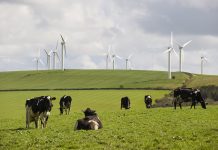So far, Europe’s biggest grids are delivering glitch-free supply, even as renewables contribute record shares of depressed demand, according to analysts Cornwall Insight.
Coronavirus shutdowns from late March pushed demand on average 20 per cent lower in the continent’s top five markets, including Germany and Britain. But wind, solar – and geothermal in some markets – have stepped into the breach.
“Many system operators are now proving able to manage grids at 70 per cent or more renewable energy, and with a much lower level of demand than would – even a few months ago – have been expected,” said Tom Andrews, senior analyst at Cornwall Insight.
“Arguably, renewables have stepped into the baseload role, with gas and limited amounts of coal fulfilling a peaking role both when demand does pick up, and when renewables output dips.”
In the four weeks from March 23, Britain’s generation fell 17.2 per cent, compared to the same period last year. Carbon intensity of the reduced generation was down 17.5 per cent, as managers scaled back CCGT output by almost 90 per cent, the analysts report.
Germany saw even steeper grid decarbonisation. Electricity generation fell 11.5 per cent over the four weeks, but its carbon intensity tumbled 35.9 per cent, Cornwall found.
Over Easter, renewables made up 55 per cent of German output. Negative wholesale prices were the result. German generators have long experienced the problem, made more intense during current suppressed demand.
Operators have for some years outlined the increasing challenge of managing low transmission demand with increased embedded generation over summer.
GB system operator, National Grid ESO, has called for urgent code changes to allow it to stop generators connected to the distribution network from exporting. It is also launching a new footroom service from tomorrow which pays generators to stop exporting, or for businesses to use more power in a bid to keep the system stable. The ESO has also struck a deal with EDF to reduce output from Sizewell B this summer.
While those measures, implemented at speed, underline the challenges facing grid operators this summer, Cornwall Insight suggests the exercise will prepare the industry for what is to come.
“The generation balance is likely to return to normal as countries come off lockdown”, said Andrews.
“However, (this survey) has demonstrated that managing a grid with high renewable penetration is feasible. This may become the new normal as more renewable generation is deployed across Europe.”
Related stories:
National Grid outlines new footroom service to tackle lockdown lows
As solar breaks records, National Grid mulls turning it off
National Grid: UK coal-free for 18 days
Coronavirus demand destruction gives National Grid another plate to spin
National Grid mulls footroom options as demand drops
National Grid awards £328m inertia contracts
Coronavirus and the power system: Keep calm and put the kettle on
Fintan Slye: Inertia has been taken for granted, it will become much more important
Demand turn up ‘not an enduring’ service, Grid to review
Demand turn up: What worked, what didn’t?
As solar generation makes history, National Grid starts to feel the burn
National Grid says impact of solar requires greater system flexibility
Click here to see if you qualify for a free subscription to the print magazine, or to renew.
Follow us at @EnergystMedia. For regular bulletins, sign up for the free newsletter.



